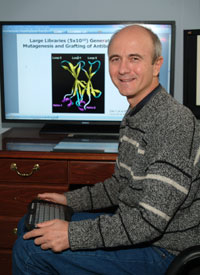Our Science – Dimitrov Website
Dimiter S. Dimitrov, Ph.D.
 |
|
|||||||||||||||||||||
Biography
Dr. Dimitrov obtained his Ph.D. in chemistry at the University of Sofia, and his Sc.D. in biology at the Bulgarian Academy of Sciences, where he was elected as a Professor of Biophysics. He was appointed to the Senior Biomedical Research Service at NIH and selected as an NCI outstanding mentor. His research focuses on development of human monoclonal antibodies including isolated engineered antibody domains for prevention and treatment of cancer and other diseases.Research
Protein Interactions
Protein interactions are important for understanding of biological function, and for prevention, diagnosis and treatment of diseases. Our research focuses on antibody-antigen and ligand-receptor interactions. We identify novel human monoclonal antibodies, characterize and improve their properties, elucidate their mechanisms of interactions, investigate antibody-mediated modulation of ligand-receptor interactions, and apply the knowledge gained to solve biomedical problems. Our major long-term goal is to develop antibody-based therapeutics including engineered antibody domains and antibody-guided nanoparticles against cancer and other diseases. Currently, we identify, engineer and characterize antibodies against components of the insulin-like growth factor (IGF) system and other cancer-related proteins, HIV, and emerging and biodefense-related microbes including Nipah and Hendra viruses, and dengue virus. We also study mechanisms of antibody elicitation and proposed a new (germline/maturation) concept with implications for development of vaccines against AIDS and other diseases.
This page was last updated on 2/19/2013.
